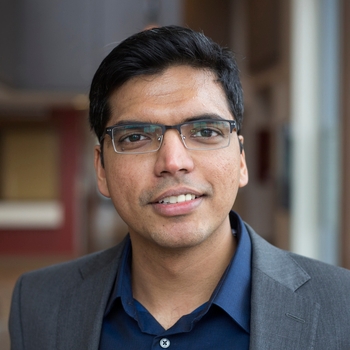
Sriram Chandrasekaran Receives Research Scout Grant
Grant to invest in ‘bold science’

Grant to invest in ‘bold science’
U-M BME’s Sriram Chandrasekaran, Associate Professor of Biomedical Engineering, has a research project being funded by Research Scouts.
Research Scouts is an agile, low-burden funding program from the Office of Research in the U-M Medical School which gives money to scientists (the “Scouts”) to invest in other scientists’ bold ideas. It’s an investment in the “Bold Science” objective of Michigan Medicine’s research strategic plan, “Great Minds, Greater Discoveries,” and is modeled on the Hypothesis Fund. The goals of the program are to:
·Spark new scientific conversations and connections
·Unleash the creativity of our scientists
·Test bold ideas that may otherwise go unexplored
·Have fun while facilitating new lines of investigation
From diverse disciplines across the Medical School, Research Scouts are given funding and are empowered and motivated to support their fellow researchers’ bold ideas. Scouts are searching for early-stage ideas that can transform our current understanding of a scientific concept or field, challenge common dogma, or are wildly new and imaginative.
“With $150k to invest, I wanted to fund Mars Shots – ideas that are a little out there and would never be funded by NIH but, if successful, could be game changers for Michigan Medicine and beyond,” says Peter Scott, Professor of Radiology and a Research Scout.
Dr. Chandrasekaran’s lab examines ways that AI can be integrated into biomedical engineering research. “I was thinking through what the big medical challenges might be 25 years from now in my field, and I thought about the future of drug discovery and how the treatment of diseases such as cancer or infectious disease might change,” he said. “Clinicians are trying to use multiple types of treatment, not just drugs, but they are also giving their patients new immune therapies or changing their diets. During the last decade, there are different types of new treatments that people are exploring. For example, people use microbiome treatment and natural products. You can compare that to traditional drug treatments, and even combine them to see how they work well together.”
Dr. Chandrasekaran’s formal Research Scout proposal says that by the year 2050, society may lose 50 million people a year to climate-change-associated health emergencies, such as the spread of drug-resistant pathogens. Suboptimal diet, lifestyle, and pollution will significantly dampen people’s immunity, while accelerating the spread of infections and immune disorders. Importantly, the pace of drug discovery has not kept up with the rapid emergence of these diseases.
Future treatments for complex diseases such as cancer and drug-resistant infections will likely involve a combination of multiple therapeutic modalities targeting immunological and metabolic processes. Yet researchers lack a rational basis to design such multimodal treatments. For example, how should precision diets be designed to potentiate immunotherapies or antibiotics?
To address this challenge, Dr. Chandrasekaran proposes developing integrative models that bridge cutting-edge simulation tools from various biomedical domains. His team will utilize hybrid AI methods to integrate mechanistic biochemical models and machine learning to impact a wide range of biological fields.
Dr. Chandrasekaran noted that the use of AI algorithms tackles issues without traditional knowledge or bias. The AI algorithm recommends solutions purely based on the data present, not with preconceived ideas of the way processes or products may have traditionally worked.
“Machine-learning algorithms can find the best way to combine different modalities, such as how you combine changes in metabolism or integrate a drug treatment,” he said. “We are trying to put completely different things together using AI to find the best treatment or combination of treatments to produce the best outcome.”
Dr. Scott thinks Dr. Chandrasekaran’s idea to use Artificial Intelligence to revolutionize drug discovery is one such “Mars Shot.” “The idea of combining multiple therapies with environmental factors such as diet and lifestyle is the foundation of Precision Health,” Dr. Scott observes. Although the data exists, we currently lack a rational basis to design such individualized therapies. “Sriram’s proposal to use neural networks and high-throughput experimentation to crunch the data and identify multimodal therapies for the most complex diseases facing our patients was a light-bulb moment,” Dr. Scott notes. “If his lab is successful, it could cause a paradigm shift for drug discovery. I’m excited to see what they come up with!”